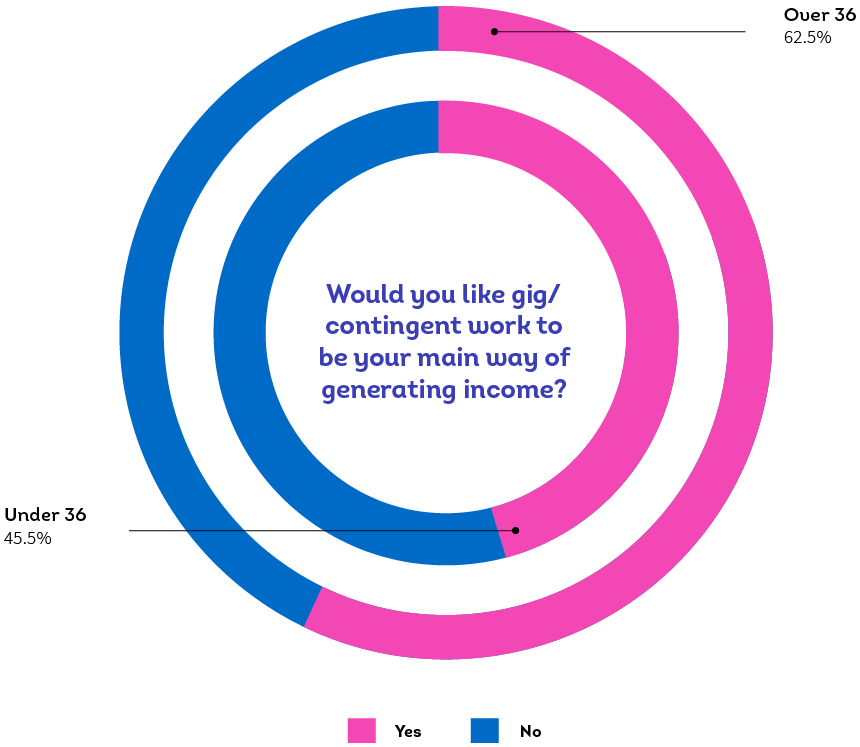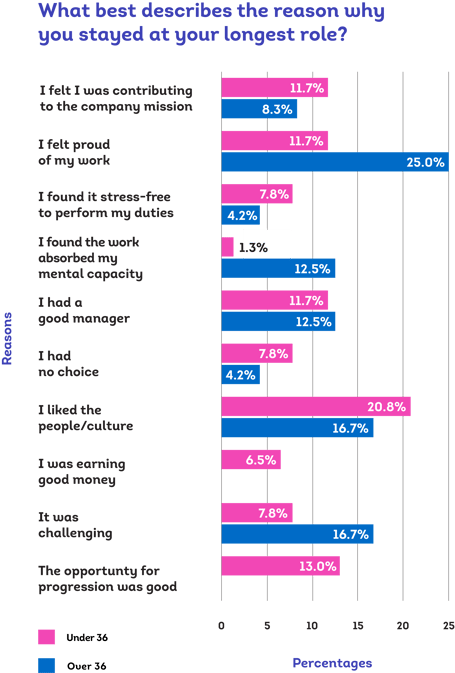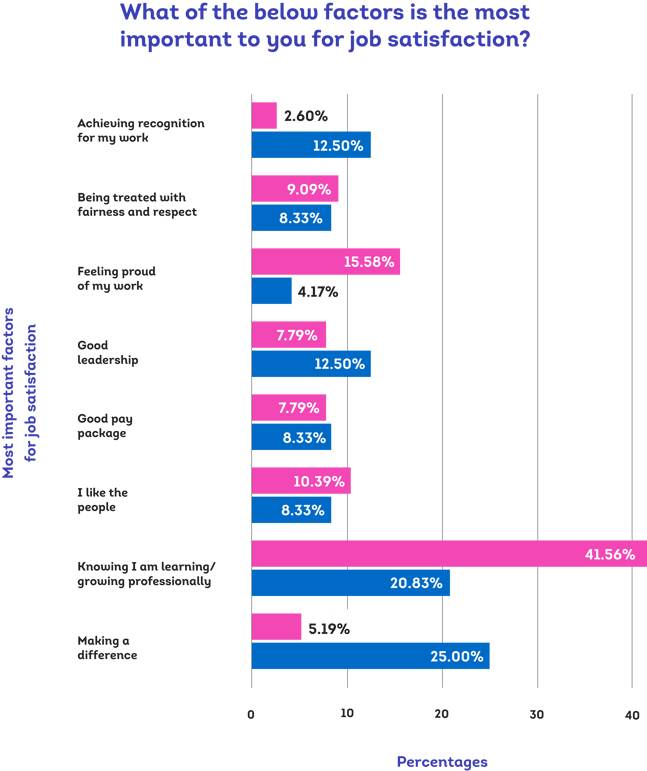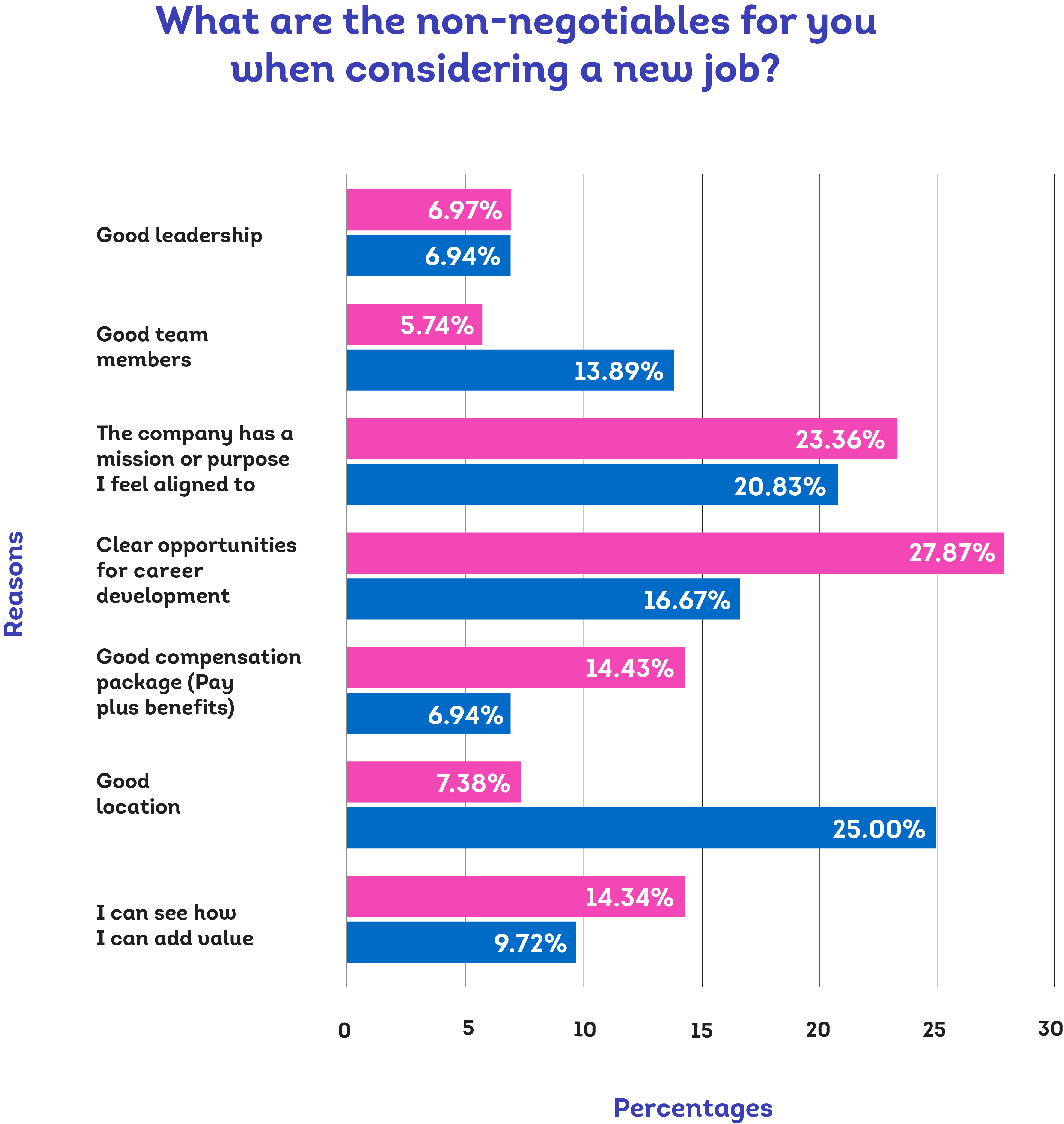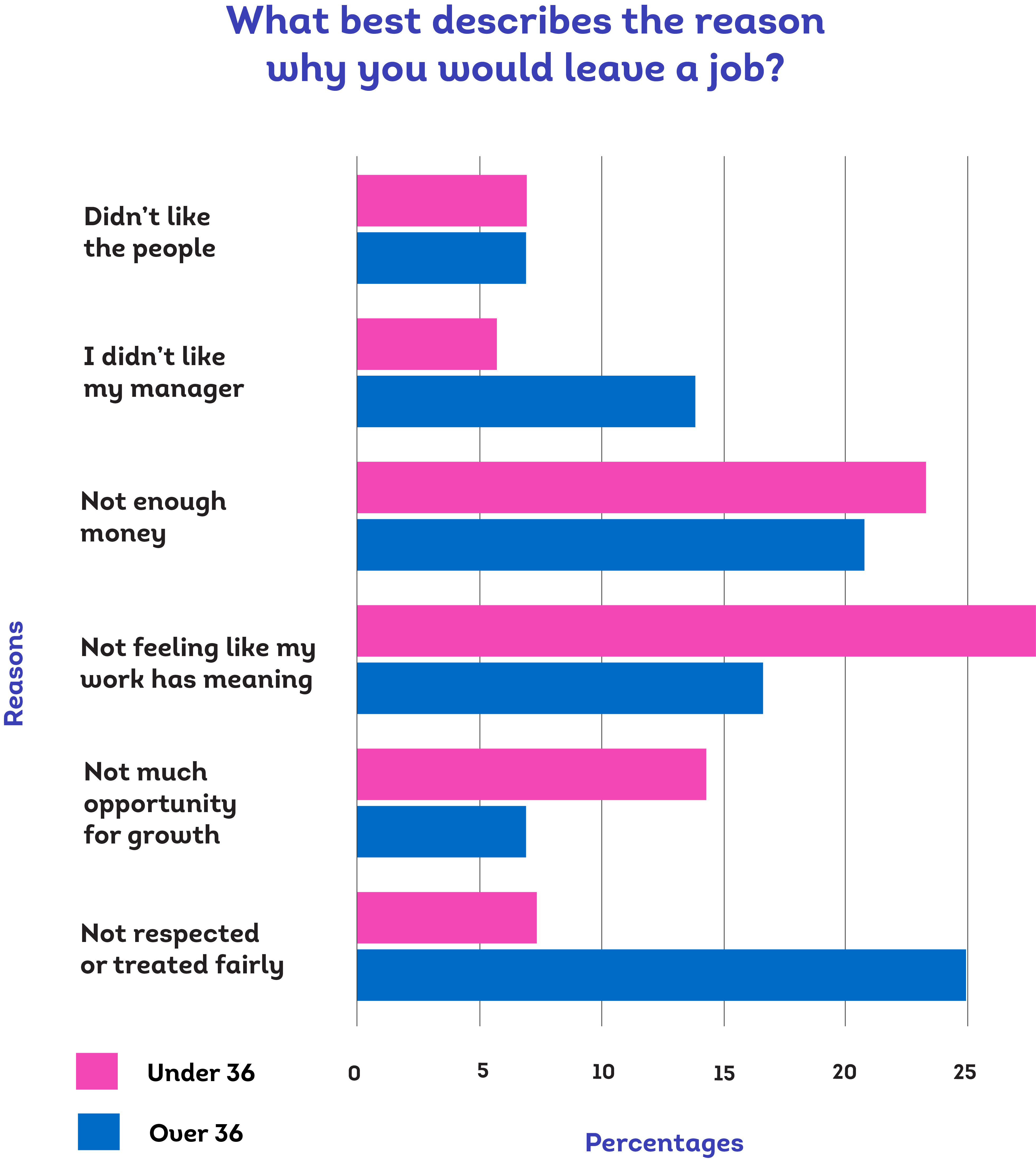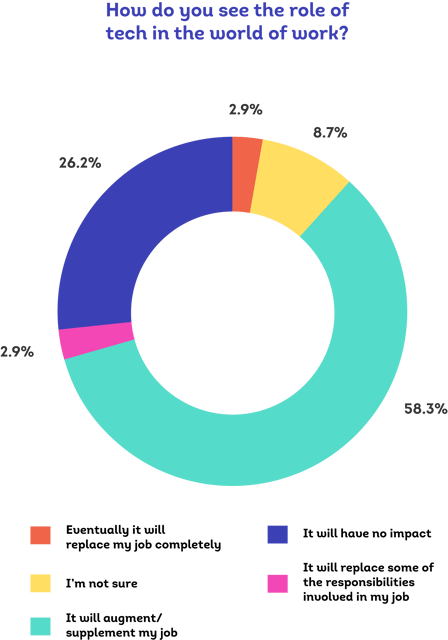The Contingent Workforce Report

The Contingent Workforce
The workforce of tomorrow is a blended one. Contingent Staffing is the growing trend that is changing how businesses operate completely, from the way they are approaching their hiring strategies, to organisational structure, technology and everything in between. The Mercer fault lines report reveals that 62% of Australian business leaders predict that their workforce will include more Contingent Staff in the near future and 75% think that “gig or temp workers will have an impact on their industry or similar businesses”
But who is this new breed of employee? Should they be considered with a different lens? Are their priorities, goals and motivations different from what we already know about employees today, Millennial and Non-Millennial alike? We surveyed over 100 members of our talent pool of Gig Workers across Melbourne and Sydney with 40 questions intended to reveal:
- What they look for in companies and leaders today
- What makes them stay
- How to keep them engaged
- What makes them leave
We’ve pulled together the key insights for you and your team in this report.
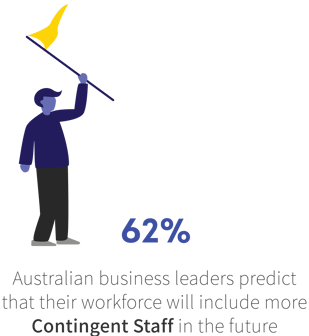
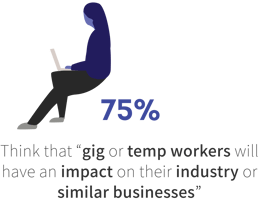
Demographics
The respondents of the survey were very reflective of the overall Weployee community with the largest cohort being Millennials (25-39 years old) at 56.5%. Next was Gen Z at 18.8% (4-24 years old) and 40 years and above making up the rest at 15.9%.
The overwhelming majority of respondents in our survey were female (66.3%) Considering males on average are the larger share of employment in Australia (53% vs 47%) it can be hypothesised that temporary work is either more accessible or preferable for females.

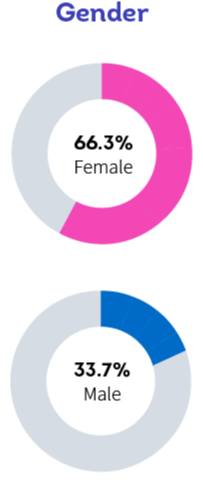
To arrange their work, most Weployees on the platform use solely Weploy as their main access to work (39%) whilst the second most popular working arrangement is having a part-time job with 8% juggling their engagements around a part-time role.
Not all Contingent Workers are entry-level
Contrary to how many employers think about contingent workers, these are not junior, entry level workers - the majority of the respondents have experience managing a team (71%) and the largest cohort having over 10 years, worth of experience in the workforce. Internal research at Weploy has found that the most successful Weployees have worked in between 3-4 different industries and have over 6 years’ worth of work experience.
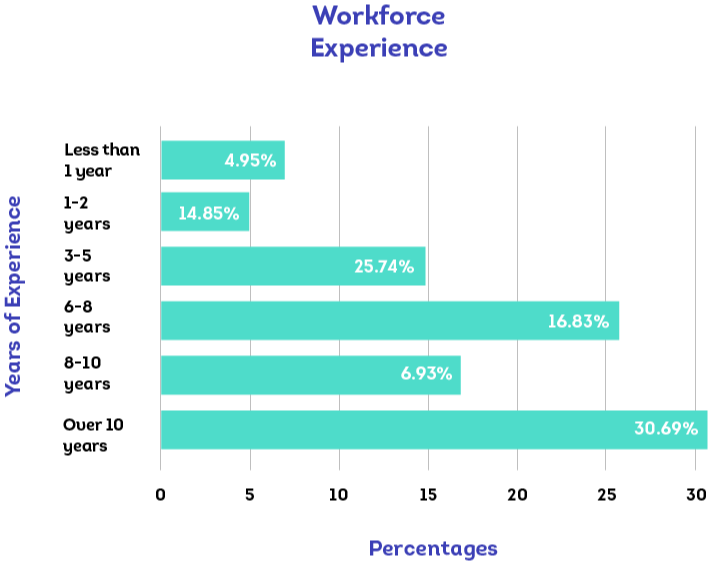
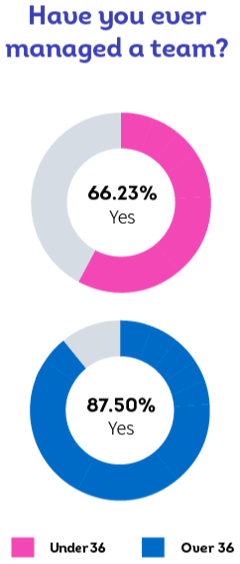
Career Goals and Aspirations
Every generation is shaped by its circumstances, and Contingent Staff are no exception. They’re no less ambitious than previous generations:
“Earning a good wage” is second only to “Work/Life Balance” in our survey respondents list of most important life goals. But pay is not a non-negotiable when it comes to their top priorities for job satisfaction (in fact, the majority claimed they are“satisfied” with the amount they are paid). Having children, buying homes, and other traditional signals of adulthood “success markers” do not top their list of ambitions. Instead, travel and feeling they are “Making a Difference” top their lists of life goals.

Life Goals
Contingent Staff today are aware of the importance of “Work/life” balance - rating it their most important goal in life. But for those over 36, the physical or tangible life goals such as “Earning a good wage” and “Owning a Property” are highly rated too - ranked as 2nd and 4th most important respectively.
In contrast, “Owning a Property” did not rank at all for respondents under the age of 36. The top rated life goals were much more introspective and focused on life experience, growth and self-development - “Making a difference” and “Travelling”
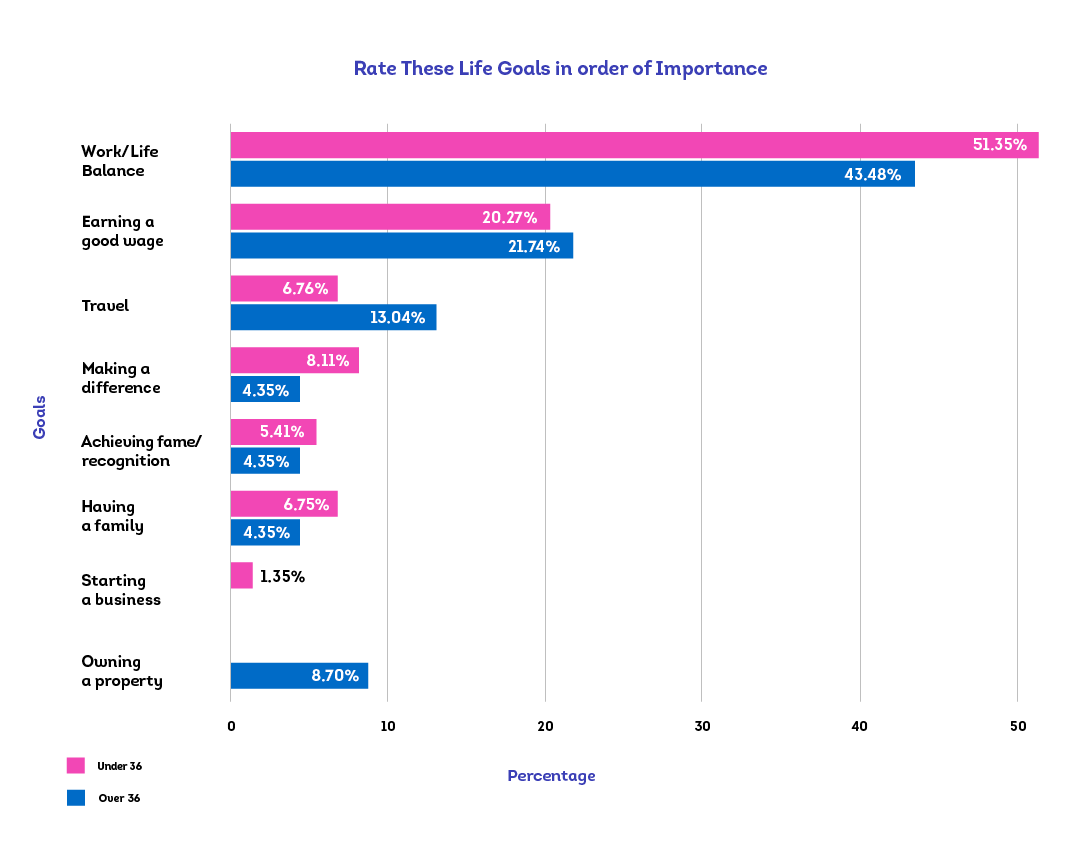
Does Company Missions or Purpose affect employee morale?
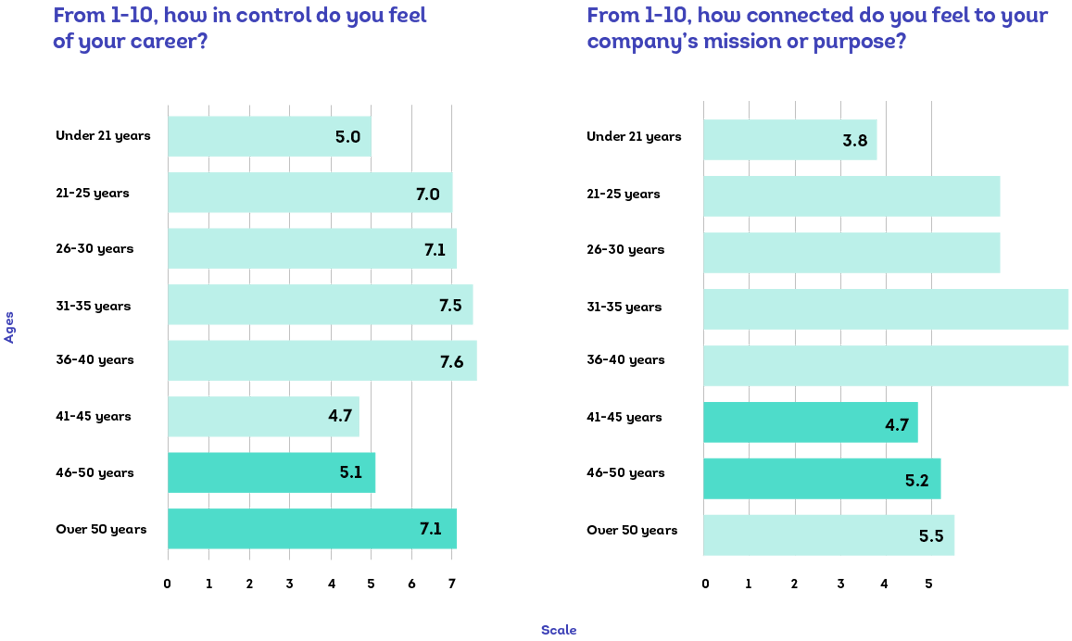
There is a steep decline in career ownership after the age of 40 amongst our respondents. This trend is echoed in the question about how far respondents felt connected to their company’s wider mission or purpose - indicating that feeling connected to the company’s overall missions/ purpose has a direct correlation to how in-control employees feel of their careers today.

So how to get around this?
Employers might be assuming that their more senior staff (of 40 years and above) are already “bought in” when it comes to the wider company vision.
They will improve their chances of building an engaged, driven and empowered cross-generational workforce, if greater care is taken to ensure the wider mission or purpose is clearly embedded into the company fabric from the top down.On-boarding Contingent Staff properly should be a priority, with a total talent strategy for more senior contingent workers, that focuses on alignment of company objectives.
Earning an Income as a Contingent Worker
A 2019 report by QUT and UTS on Digital Platform Work in Australia stated that: Only 19.2% of current platform workers derive half or more of their income from platform work. When considered against the full sample, this represents around 1.4% of all survey respondents.
There is a very different outlook amongst those that have made the jump into contingent work however. Almost exactly half of the contingent workers who responded to our survey indicated they’d like platform work to make up their total income, suggesting that once they’ve tried it - the experience has been positive.
The very slight difference between those under 36 vs over 36 indicates that older contingent workers are in fact happier than younger ones, and find it suits their lifestyles and professional goals better.

Motivations and Drivers
The strongest motivations for undertaking platform work in the QUT report are ‘earning extra money’.
The results of our study reveal that Weployees de-prioritise their perceived earning potential in favour of benefits relating to flexibility and their opportunities for learning and development.
There were no significant differences between those over 36 and those under.
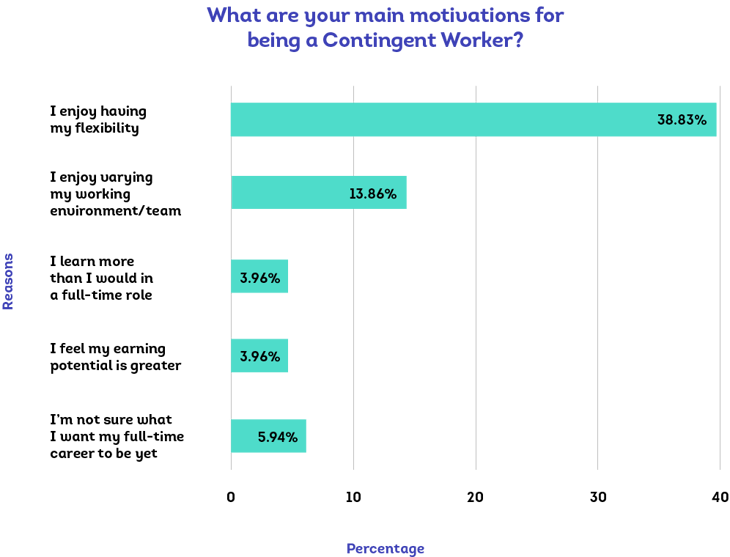
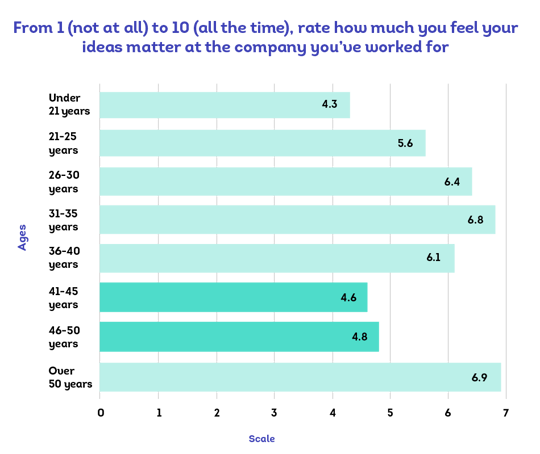
Feeling Valued as a Contingent Employee
As the eldest of our respondents, the “Baby Boomers” of the contingent workforce unsurprisingly, feel most like they are taken seriously in businesses.
Contingent Millennials (which make up the majority of the full base) are second most likely to be taken seriously - indicating they have important insights to bring to the table - whatever company they’re working for.
Whether it’s as a result or a cause of their working arrangements - the average rating that contingent staff in their mid-late 40s felt their ideas mattered less, which employers should be mindful of in todays’ blended workforce.
How to make your employees feel as though their ideas matters:
1. Spend time with them
Surprise surprise - the more time you spend with someone, the more you are saying they are valued enough to warrant your time. In 2011, The Society for Knowledge Economics released research from interviews with 5,661 employees in 77 Australian organisations. The findings demonstrated that the single biggest difference in leadership behaviour between high and low performing workplaces was the time spent by leaders with their team members.
2. Find their emotional drivers
Physical engagement is well and good, but having “Emotional Engagement” is what triggers that heart and soul buy in from employees and will drive them to go the extra mile. Good leaders are ‘meaning makers’ who help each employee find his or her personal meaning through their work activities.
3. Establish a vision of the future and outline it clearly from on-boarding
77% of employees surveyed in the Society for Human Resource Management’s annual Employee Job Satisfaction and Engagement survey said it was important to their job satisfaction and engagement to have a clear understanding of their organisation’s vision and mission.
4. Tailor communication styles to your employees
In a blended workforce of all ages, demographics and employment arrangements, the importance of adapting your management practise to suit is critical. Find out how they like to learn and then structure their opportunities to learn around that style. Seeing you adapt to their ways should increase their engagement because you have shown that you listened to what they said.
5. Respect them
By fostering a workplace environment that emphasises communication, respect for others and collaboration among workers at all levels, HR professionals can expect higher levels of engagement from their employees. The respondents of our study rated “not being treated with respect” as the second most important reason for why they would leave a role. 6. Leverage the energy of Contingent Staff Everyone knows that new starters are more excited, motivated and full of new ideas - and how many of us have experienced the slow decline in engagement of longer standing employees? But that experience and 360 degree business knowledge is also essential for improving outcomes, so re-engaging those demotivated employees should be a priority.
“Contingent Staff bring genuine enthusiasm which rubs off and makes the whole team better”

Ideal Working Environments for Contingent Staffers
We have learnt that Contingent Staff today are increasingly aware of the importance of separating their lives from their work. Contingent Staff are also acutely aware of the importance of protecting their own physical and mental well-being, and the role that employers have to play in learning and development.
Despite admitting that “Earning a Good Wage” is their 2nd most important life goal, when it comes down to describing what they are looking for in the companies they choose to work for, Millennial and Non-Millennial staff are not willing to sacrifice their personal wellbeing in exchange for a great pay package. As a result, most rated “Having a good team” and a positive “Workplace Culture” as the top reasons for staying in a role (37%) and “Knowing I am Learning and Growing” was the most important factor for job satisfaction for 63% of our respondents.

What do Contingent Staff value most in Companies today?
Internal Company Culture (of colleagues and managers) and Opportunities for progression are the most important factors for Millennial Contingent Staff to stay in their roles today.
The statistics about Culture are widely reported on for a number of business reasons, including:
- Reduced employee turnover
- Improved employee satisfaction levels
- Improved workplace productivity
- Higher retention
- A fun, positive and healthy environment.
Workplace Culture needs a top-down, “always on” approach, to match the way employees are approaching their professional and personal lives today.
For the retention of older Contingent employees, being assigned challenging work, and feeling proud of it are the most important factors which should encourage employers to entrust more senior Contingent Staff with higher value tasks... and if it’s completed well - take greater care to reward and remunerate them.
In contrast to what they claimed were their most important life goals, Contingent Staff are not primarily driven by money. Learning, and personal development is essential for job satisfaction, taking top position for the majority (36%), whilst pay/remuneration is amongst the least important factors at 7.8%.
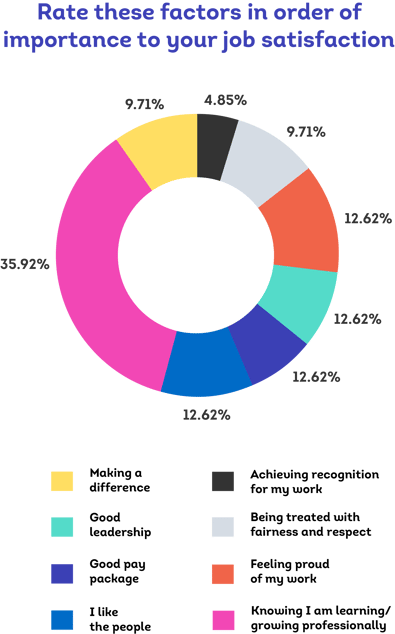
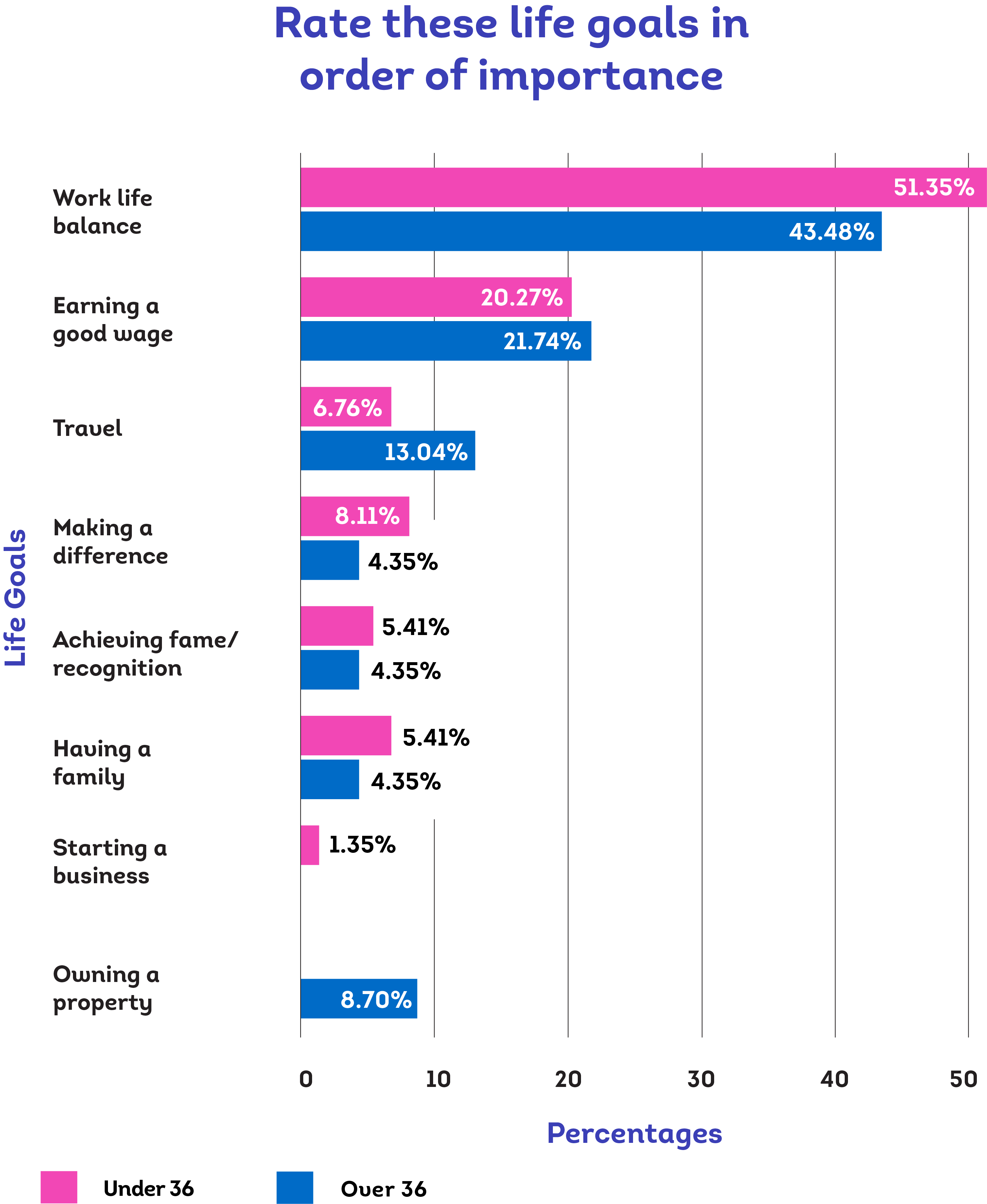
Older Contingent Staff care more about making a difference than millennials.
Looking at this in further detail between Millennial and Non-Millennial respondents, it can be seen that the most important factors for job satisfaction amongst our millennial respondents are internally focussed.
Personal and professional growth was voted the most important (42%
of sample) and feeling "Proud of my work" following as the 2nd most important (16%). External factors were most important to our Gen Xers however - who rated “Making a Difference” and “Achieving recognition for my Work” as 1st and 3rd most important.

Long commutes are a real turn-off for older workers...
Millennials are purpose driven and ambitious, with 27.87% of our respondents claiming “Clear opportunities for career development” as their highest priority when considering a new role.
This is closely followed by “The company has a mission or purpose I feel aligned to” but this factor drops back in priority for Non-Millennials. Whilst non-Millennials are 2.3 times more likely to stay when they have a strong connection to the company purpose, Millennials are 5.3 times more likely. In order to attract and retain contingent talent of all ages, companies must focus on clear articulation of their mission or purpose.

After flexibility, “Feeling like my Work Has Meaning” was the 2nd most important factor for Contingent staff when it comes to their perceived work/life balance.

Rated more highly than social activities and fancy wellbeing initiatives like free yoga and meditation rooms - if employers take care to illustrate the meaningful impact of the work they are doing for the business or for the wider world, Contingent staff (/Weployees) are happy to put in the hours.
Meaningful work is a priority for Contingent Staff.
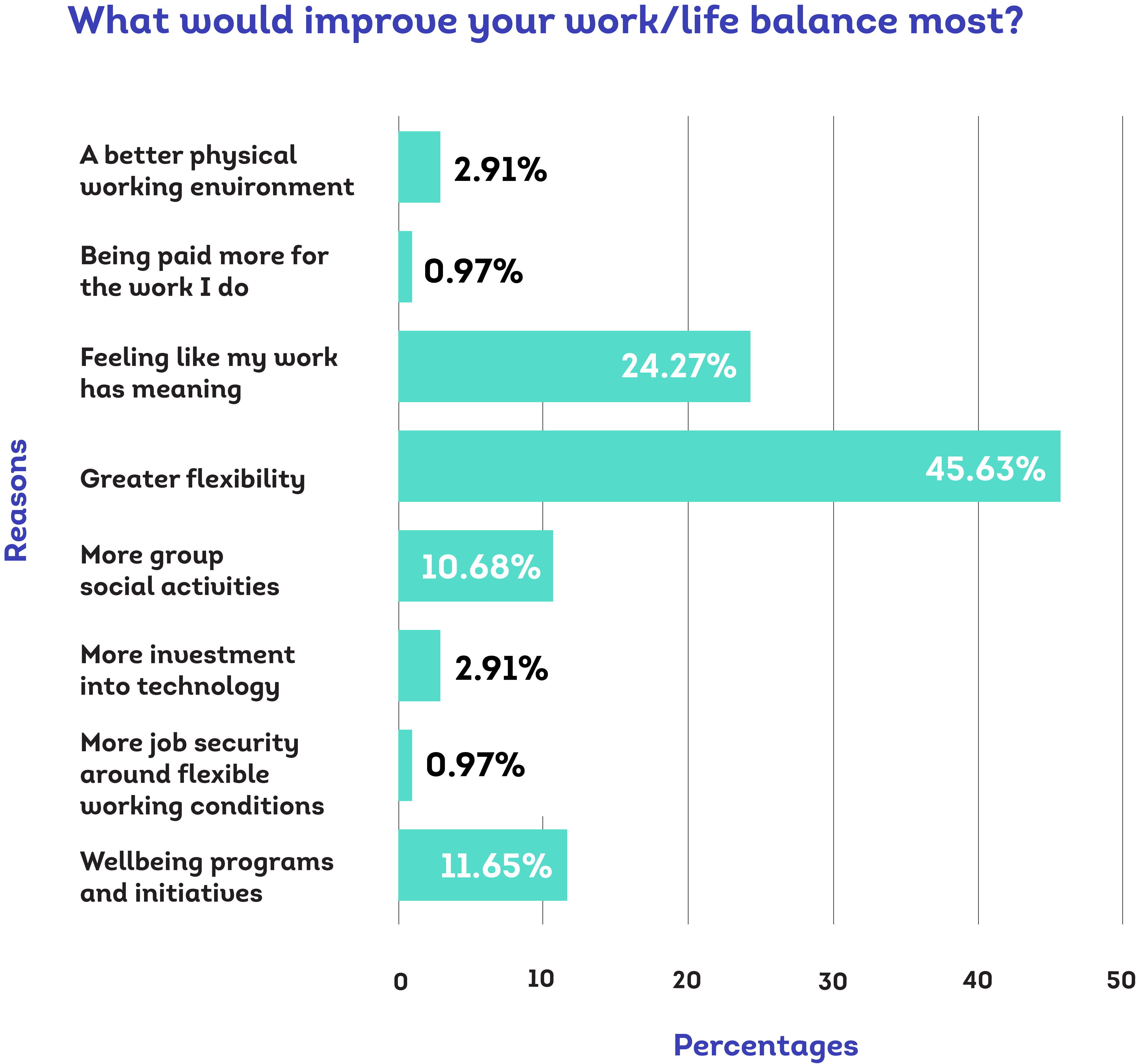
What Puts Contingent Staffers OFF Companies Today
Contingent staff today are not working for a paycheck - they are working for Purpose and actively looking for roles that enhance their Career Growth and Personal Development. In a world post-Cambridge Analytica, where political/religious leaders are failing to have a positive impact on the world, or even be taken seriously, they are looking for companies and leaders in whom they can trust.
Aussie workers are more protective than ever of their internal beliefs systems, personal lives, their personal data and how it is shared. It makes sense that they hold the social and ethical behaviours of the companies and leaders they choose to work with, in high regard.

Contingent workers are driven, with growth mindsets, citing “Not having much opportunity for growth” as their top reason for leaving a role.
The benefits of effective career development practice in the creation of healthy organisations is well-researched (O’Donnell, 2007) Practices that facilitate employee growth and development have long been linked to increased productivity, decreased absenteeism and turnover, and boosting general feelings of commitment to an organisation. In a global market where skilled workers are in short supply, these practices become even more important.
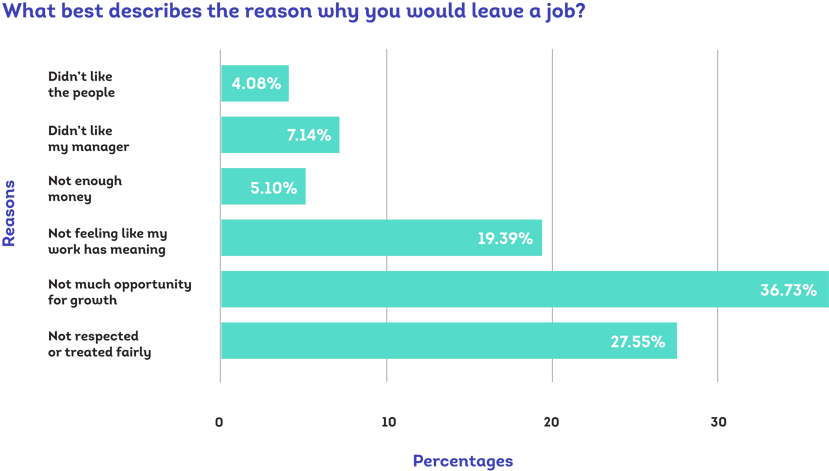
Older Contingent Staff admit they are most put off by companies that don’t respect them
Looking deeper into the question “What best describes the reason why you would leave a job”, the blue bar in this chart shows that for the retention of older Contingent Staff today - “Opportunities for growth and development” falls behind feeling “Respected at work” or being "Treated unfairly."
We’ve learnt how entrusting older Contingent Staff with challenging work is key for their job satisfaction - the fact that the majority of this sample pool rate “not being treated with respect” as their top reason for dissatisfaction in a role may suggest that there’s a misalignment in the work being assigned to older Contingent Staff and the work they feel they are fairly due given their experience/skills.

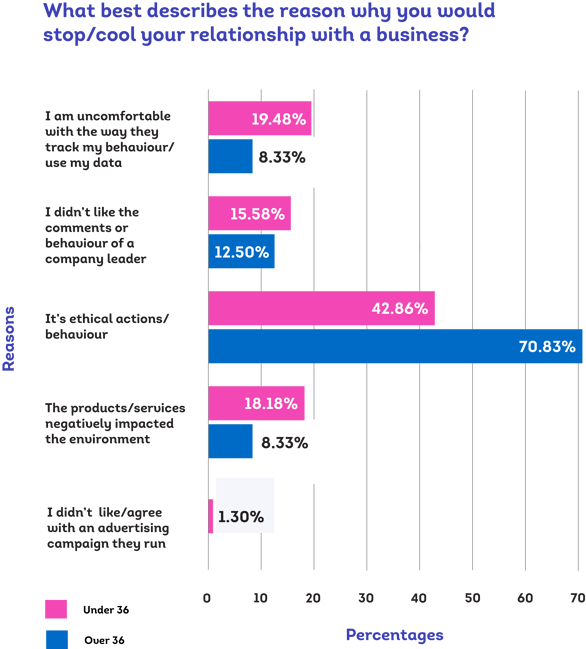
Contingent staff on the whole are largely concerned by the ethical/long term actions of the companies they work for, listing “It’s ethical actions” and “It’s products/services negatively impacted the environment” amongst their top 3 reasons why they would cease relations with a company.

The importance of good leadership is highlighted as a key factor for the retention of Millennial gig workers, who voted “I didn’t like the comments or behaviour of a company leader” as the 3rd most important reason why they’d stop or cool their relationship with a company.

Managing, and Improving Contingent Staff Engagement
“Encourage and empower me to challenge myself. Work with me to complete the strategic objectives of the organisation”
- Anonymous Weployee
Unsurprisingly, having a manager that is experienced is less important to older and more experienced Contingent Staff than it is to Millennials. Contrastingly, older Millennial Contingent Staff rated being prioritised as the top tip for good management. This reinforces the idea that employees post 40 years old experience a dip in engagement because they are being overlooked by upper management and feel they are being treated unfairly as a result.
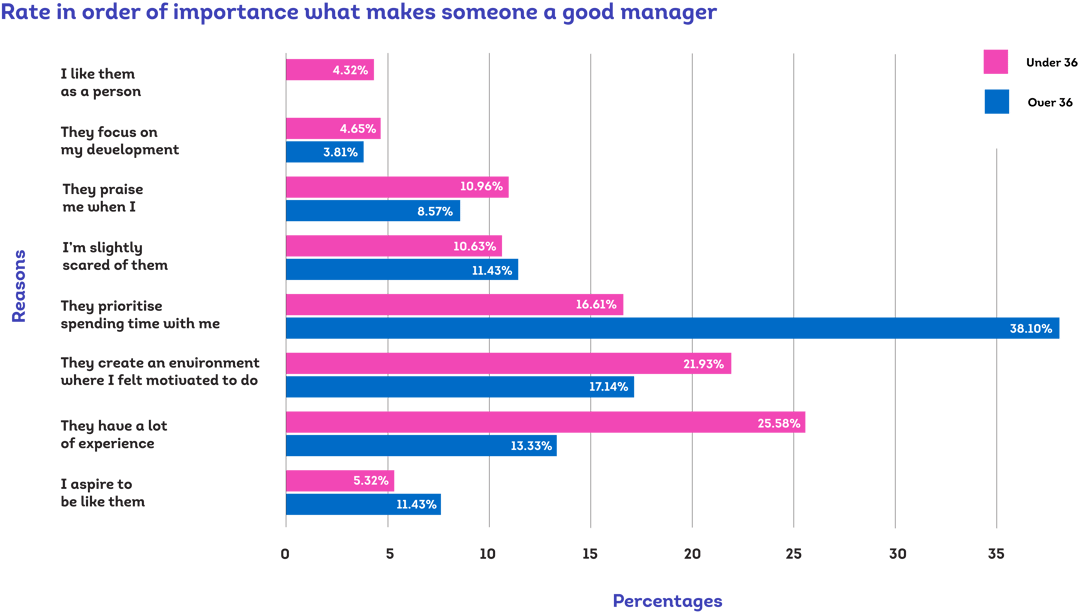
Tailored Management for Contingent Workers
The importance of generationally tailored managerial styles is becoming clearer. Whilst Millennial Contingent Staff look for cohesive teams and goals-driven management, older Temps are looking to be challenged, rewarded and respected above all by senior staff members.
Whilst good managers for Non-Millennial employees don’t necessarily need to be more experienced or aspirational, it is important they are prioritising their Gen X workforce with regular catch-ups and 1-1s.
The responses to our questions about effective management reveal that, unfortunately there is no shortcut for good management practice. Both Millennial and Non-Millennial respondents voted that “Once Per Week” is the ideal frequency to catch up with their manager (44.66%). The top three most important factors for good leadership are “Leading by Example”, having “Good Communication” and “Transparency” - all of which require significant time investment.


As well as tangible face-time spent with team members (or “desk-side manner”) walking the walk and talking the talk, there must be time spent behind the scenes developing OKRs, filling in performance reports, driving development plans and organising opportunities for training and coaching (as well as attending them!)

Clear reminders of the company missions, values and overall goals has come up time and again as an important factor for Contingent Staff satisfaction and retention. Communicating these with transparency and honesty is also essential for good leadership.
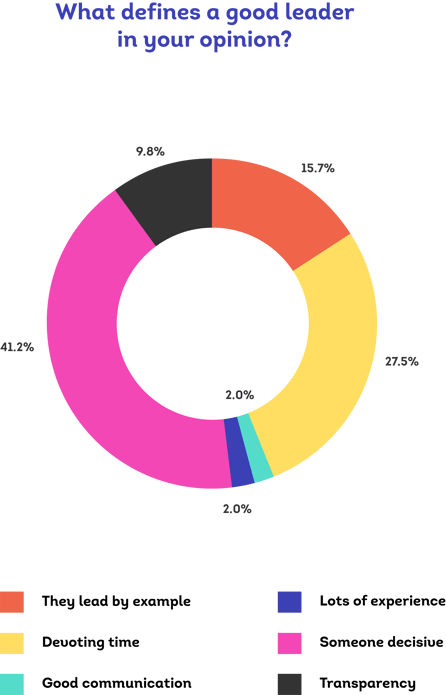
What do you need most from a good manager?

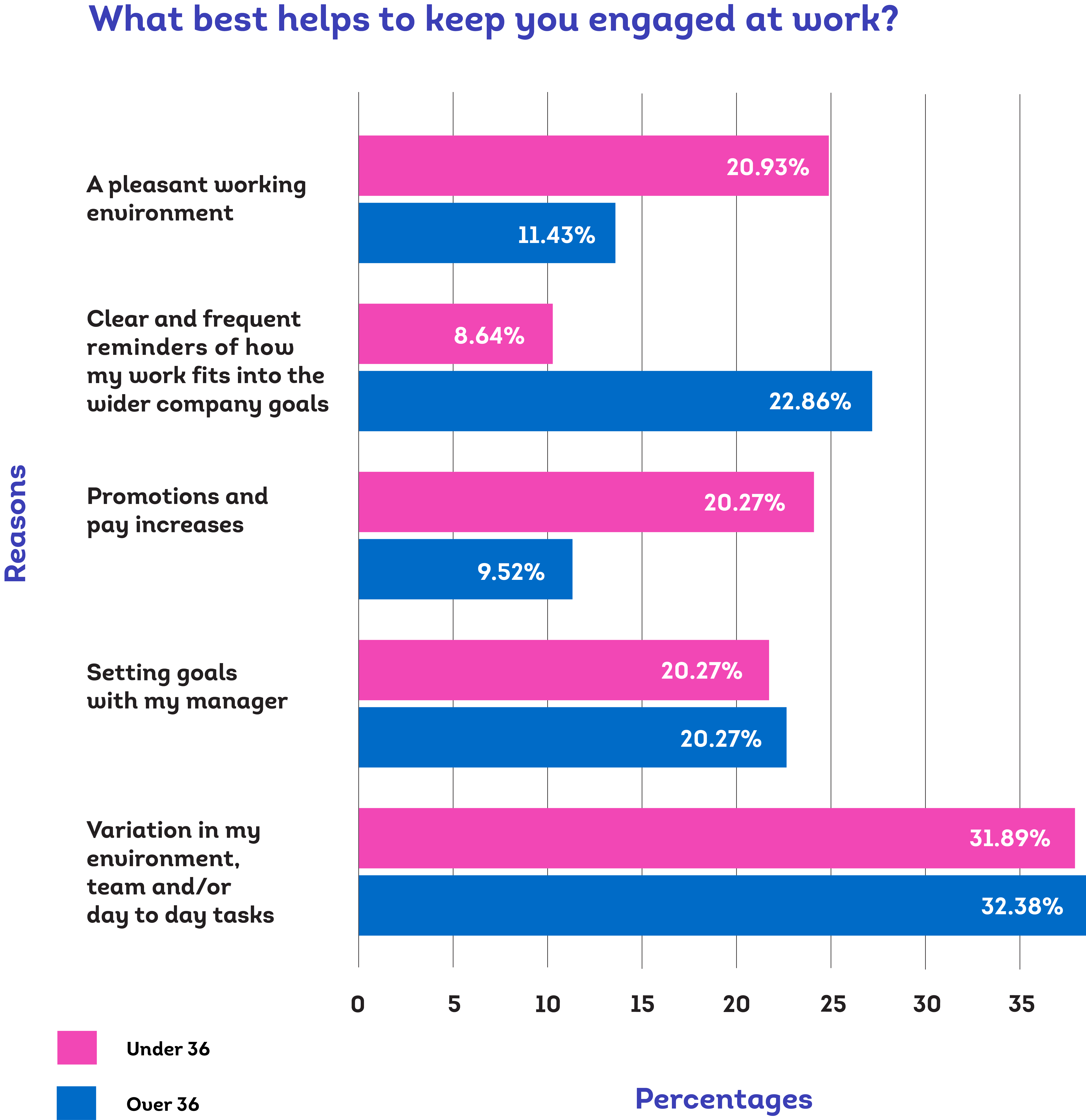
Engaging Contingent Staff...
One of the few questions that both Millennial and Non-Millennial respondents were agreed upon - “Variation in Environment, Teams and Tasks” is the most important factor for engagement at work (Such is the nature of Contingent Staffing by definition).
The second most important factor for Millennial Contingent Staff is the working environment or culture, whilst older employees need a little more visibility across wider company goals, values, and a view on how their work is fitting into it.
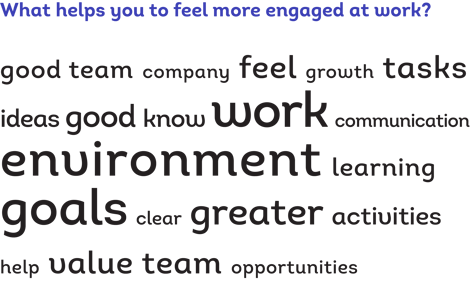
“Feeling aligned with the company values and goals. The work environment is also important, building good working relationships with colleagues for positive collaboration is key. Empowering people and letting them flourish in the skills where their strengths are is most effective and engaging.”
Tailored Management for Contingent Workers
As early adopters of HR tech tools like Weploy, the majority of our respondents were positive about the role of tech in the future of work.

Conclusion

As modern organisations become less anchored by legacy structures, they are enjoying the increased agility and flexibility resulting from a contingent workforce. Successful business leaders today must embrace the concept of a blended workforce of employees, with differing working arrangements. Organisations have faster access to diverse teams with wider ranges of skills, and with digitally enabled market labour solutions it is easier than ever to scale teams up and down to match customer requirements. Technological advancements mean that teams can operate across offices, across states and even across countries, and this diversity of thinking has been proven to result in better business outcomes and increased margins.
But the growth and success of any workplace depends on the retention and engagement of its employees, whether they are Full-Time, Contracting, Temporary, Contingent, in situ, or remote, and it is clear that the differentiating motives, goals and priorities of Contingent Staff when considered as a research pool unto themselves, mean that what we know about employee engagement must be re-learnt, re-considered and restructured in light of today’s blended workforce.

Contingent staff, Millennial and non-Millennial, show deeper loyalty to employers who boldly tackle the issues that resonate with them most - both internal and external. Protecting their personal data and Mental Health, as well as the environment and welfare of those around them. As consumers, they are most likely to stop spending their income on companies whose ethical actions or behaviour they didn’t agree with, or whose products or services negatively impact the environment.
So what does this mean for businesses?
Talent today needs to know that all of the talk business gives to purpose, will result in meaningful action. They expect business to enhance lives and provide livelihoods and seek business leaders who are visibly striving to spark positive change.
For optimal engagement and job satisfaction, they need to see how they are contributing to these matters in their day to day as well.


As employers therefore, leaders should be taking visible and vocal stances that assume responsibility for delivering societal impact. It is recommended they open a dialogue with their employees of all ages and working arrangements, to discuss their concerns and understand which issues matter most.
Furthermore, the importance of a supportive working environment and positive workplace culture came up time and again - 28% of the respondents voted “Not Being Treated Fairly” as the top reason why they would leave their job, and this is of particular importance to older contingent staff.
For better engagement and job satisfaction amongst Contingent Workers, clear and frequent articulation of overall company missions, goals and how staff are contributing to these is critical, especially in the case of Gen X employees, who admitted they experienced a drop in how connected they feel to their companies mission (an average of 4.7 out of 10, down from 8 for 31-40 year olds).
The Roadmap for Business
- Balance profit with protecting the planet, and helping to solve society's most challenging problems
- Create a culture that allows for flexibility, and encourages diversity, inclusion, and innovation
- People are working longer than ever and despite their experience, older generations should not be excluded from mentorship initiatives that help them with personal and career growth.
- Educate people throughout their organisations to encourage behaviours and attitudes that support their business’s priorities.
- Leverage the usage of best-in-class cloud-based technologies throughout all operations, but take a lead on safeguarding staff members and data from physical and digital threats.
- Examine ethics and behaviour and reviewing how far they are intruding into people’s lives.
- Demonstrate internally and externally what they are doing to make the world a better place.

Deloitte reports that 52% of Millennials expect to work independently and the Contingent Staffing trend is on the rise - according to Oxford Economics, 83% of Executives say they are increasing their use of Contingent Staff. Millennials and Gen Xers make up more than half the world’s population and, together, account for most of the global workforce.
Contingent staff aren’t the future—they’re the present. They can make or break entire enterprises, and they aren’t afraid of leaving companies whose values or leaders they don’t feel aligned with. There’s a tremendous and genuine opportunity for business leaders to capture the hearts and minds of our contingent staff and inspire them to work together with full-time staff members to build productive, happy and engaged teams who can really make an impact.
